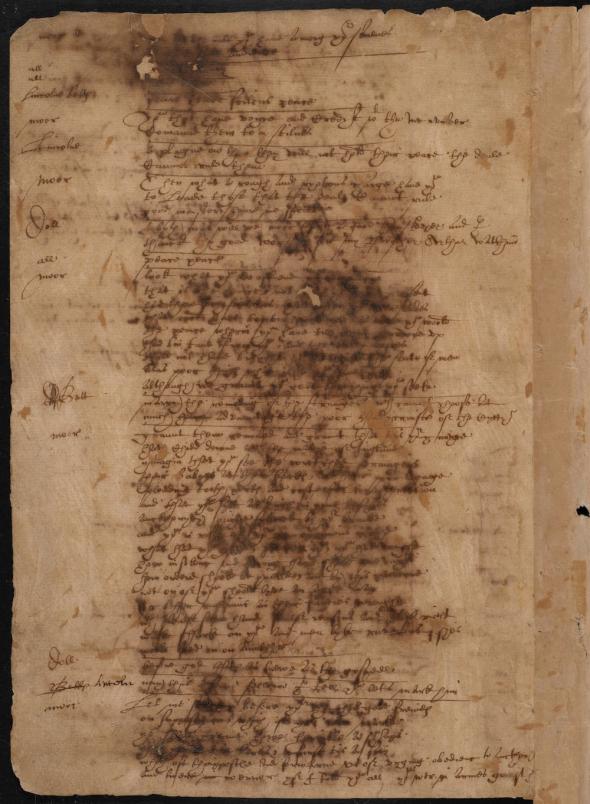A Plea on Behalf of Immigrants, Written (Most Likely) in Shakespeare’s Hand, Now Digitized
The British Library has recently digitized part of a multi-authored play, "The Booke of Sir Thomas Moore," written between about 1596 and 1604. Three pages of this draft of the play are apparently written by William Shakespeare, and they represent the only available sample of his handwriting in a play script.
Another playwright, Anthony Munday, wrote the bulk of the play, about the life of Henry VIII's chancellor Sir Thomas More. Shakespeare was apparently called in to add a single scene to the middle of the script: a speech the historical More gave on May Day 1517, calming rioters who were looting and destroying property in an attempt to expel foreigners from London.
The authorship of this piece of the manuscript is controversial, and the British Library, while tagging Shakespeare as one of the play's authors, also hedges its bets somewhat: "Three pages of the manuscript ... have been identified as Shakespeare’s, based on handwriting, spelling, vocabulary and the images and ideas expressed."
"Though proving that More’s words were indeed written by Shakespeare is not straightforward, in their keen sympathy for the plight of the alienated and dispossessed they seem to prefigure the insights of great dramas of race such as The Merchant of Venice and Othello," the British Library's Andrew Dickson writes. "Whoever wrote them had a fine ear for the way rhetoric can sway a crowd ... but also a sharp eye for the troubled relationship between ethnic minorities and majorities."
Partial text of the speech, from Sylvia Morris of the Shakespeare Blog and the British Library:
Grant them removed, and grant that this your noise
Hath chid down all the majesty of England;
Imagine that you see the wretched strangers,
Their babies at their backs and their poor luggage,
Plodding to the ports and coasts for transportation,
And that you sit as kings in your desires,
Authority quite silent by your brawl,
And you in ruff of your opinions clothed;
What had you got? I’ll tell you: you had taught
How insolence and strong hand should prevail,
How order should be quelled; and by this pattern
Not one of you should live an aged man,
For other ruffians, as their fancies wrought,
With self same hand, self reasons, and self right,
Would shark on you, and men like ravenous fishes
Would feed on one another.
You’ll put down strangers,
Kill them, cut their throats, possess their houses,
And lead the majesty of law in line
To slip him like a hound.
Alas, alas! Say now the king
Should so much come too short of your great trespass
As but to banish you, whether would you go?
What country, by the nature of your error,
Should give you harbour? go you to France or Flanders,
To any German province, to Spain or Portugal,
Nay, any where that not adheres to England,
Why, you must needs be strangers: would you be pleased
To find a nation of such barbarous temper,
That, breaking out in hideous violence,
Would not afford you an abode on earth,
Whet their detested knives against your throats,
Spurn you like dogs, and like as if that God
Owed not nor made not you, nor that the claimants
Were not all appropriate to your comforts,
But chartered unto them, what would you think
To be thus used? this is the strangers case;
And this your mountainish inhumanity.
Watch Sir Ian McKellen deliver the speech, below; his preamble ends and the monologue begins around 2 minutes 45 seconds.

